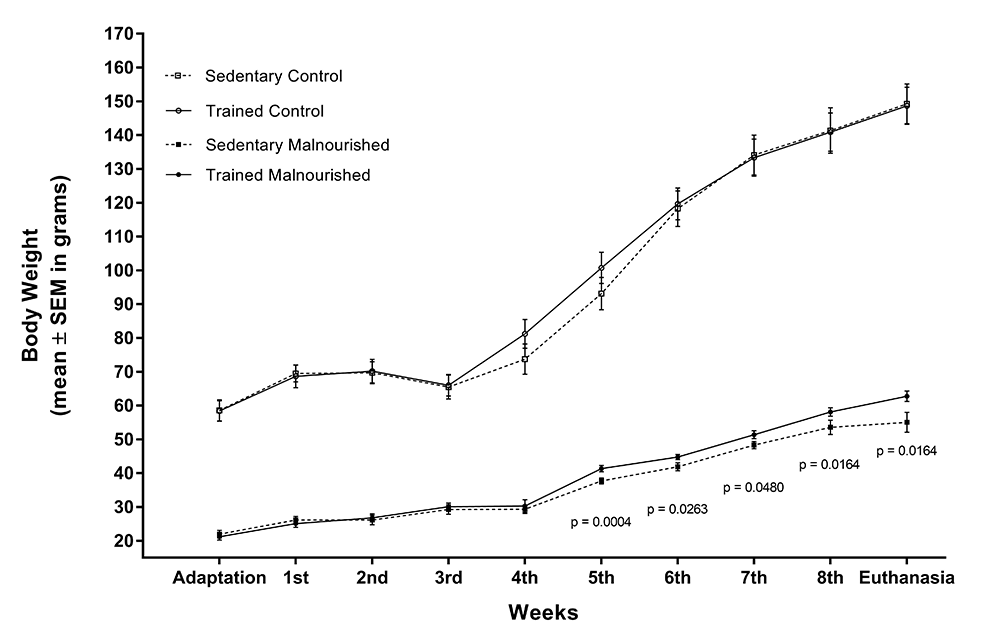By Emerson Cruz de Oliveira, Professor, Universidade Federal de Ouro Preto (UFOP), Centro Desportivo da UFOP, Laboratório de Fisiologia do Exercício, Biomecânica e Desempenho Humano, Ouro Preto, MG, Brazil

Researchers at Sports Center and Nutrition School of Federal University of Ouro Preto (UFOP) have demonstrated the benefits of physical exercise in malnourished animals. It was verified that malnourishment worsen liver health indicators, corroborating previous studies (KUMARI, et al., 1993), affects oxidative stress markers and generates weight loss. Physical exercise improved these indicators and generated weight gain, thus reversing the biggest feature of malnutrition. Other physical exercise benefits for malnourished animals had already been reported (GALDINO, et al., 2000). The research was conducted at the laboratories of UFOP (Ouro Preto, MG) and was published at Revista de Nutrição (vol. 31, no. 5) under the title “Physical exercise improves body weight gain and liver function in malnourished rats without disturbing the redox balance”.
Despite being carried out in an animal model, the research is innovative because its results open new perspectives for future studies at human beings, because they generate new questions:
a) Can humans affected with diseases that cause malnutrition be able to perform physical exercises without harming their health even more? What are the benefits of exercise for elderly affected by malnutrition?
b) Do running and sweating games really protect malnourished children from malnutrition harms?
d) What are the other benefits exercise can bring to malnourished organisms? How would the recovery from the early malnutrition be?
At this research, thirty-two rats were equally divided into Sedentary Control, Trained Control, Sedentary Malnourished and Trained Malnourished groups. The training protocol consisted in swimming continuously for 30 minutes, 5 days for week, for 8 weeks.
Figure 1. Growth of trained and untrained control and malnourished rats. After the fifth week, trained malnourished animals have greater body weight than sedentary malnourished animals (p-value in the graphic). No differences between sedentary control and trained control animals were observed.
Early malnutrition was achieved by reducing the total amount of protein offered in the animals’ diet. Thus, from the moment of birth, the animals already received less amounts of protein than their needs, and consequently showed an impaired growth, as shown by the body weight data of malnourished animals (image). In this experiment, malnourished adult animals did not reach the weight of young animals from the control group.
Oxidative stress is another topic that has been attracting the researchers’ interest for some time, but there are still many knowledge gaps that need to be fulfilled, which justifies the present study. Thus, oxidative stress was investigated in a malnutrition context, which worsens redox balance, associated with physical exercise that, if performed in a light to moderate manner, may improve this balance.
This research was approved by the Ethics Committee for the use of Laboratory Animals of UFOP and accomplished with resources from Fundação de Amparo à Pesquisa do Estado de Minas Gerais (FAPEMIG) from Conselho Nacional de Desenvolvimento Científico e Tecnológico (CNPq) and from Pró-Reitoria de Pesquisa e Pós-Graduação (PROPP) da Universidade Federal de Ouro Preto (Edital PROPP 07/2018).
References
GALDINO, R., et al. Protein malnutrition does not impair glucose metabolism adaptations to exercise-training. Nutr Res [online]. 2000, vol. 20, no. 4, pp. 527-535, ISSN: 0271-5317 [viewed 07 February 2019]. DOI: 10.1016/S0271-5317(00)00144-5. Available from: https://www.sciencedirect.com/science/article/pii/S0271531700001445
KUMARI, R., et al. Serum enzyme abnormalities in protein energy malnutrition. Indian Pediatr [online]. 1993, vol. 30, n. 4, pp. 469-473, e-ISSN: 0974-7559 [viewed 07 February 2019]. Available from: https://www.ncbi.nlm.nih.gov/pubmed/8288327
To read the article, access it
OLIVEIRA, E.C., et al. Physical exercise improves body weight gain and liver function in malnourished rats without disturbing the redox balance. Rev. Nutr. [online]. 2018, vol. 31, no. 5, pp. 443-453, ISSN: 1415-5273 [viewed 07 February 2019]. DOI: 10.1590/1678-98652018000500002. Available from: http://ref.scielo.org/nt5kxq
External links
Revista de Nutrição – RN: <http://www.scielo.br/rn>
Como citar este post [ISO 690/2010]:














Recent Comments